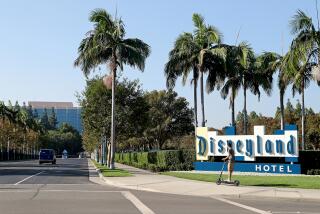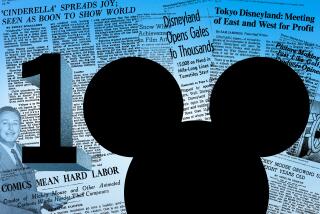Battle Over Poohâs Money Pot
There appears to be more money than honey in the pot of Winnie the Pooh.
Think, think, think . . . billions.
A family-owned company that receives royalties from the sale of Pooh merchandise claimed Tuesday that Walt Disney Co. has cheated it out of $35 million by failing to report at least $3 billion in Pooh-related revenue since 1983.
Although the case has been entangled in Los Angeles County Superior Court for a decade, Tuesday was the first time a dollar amount was attached to the claims of Stephen Slesinger Inc., which bought the rights to merchandise featuring the silly olâ bear in 1929.
âItâs an enormous amount of money, and you also have to calculate the going-forward value,â said Bertram Fields, who represents Slesingerâs heirs, who live in Tampa, Fla. âWe are talking hundreds of millions of dollarsâ in future royalties.
Under its agreement with Disney, Slesinger Inc. receives an average of 1.2 cents of every dollar of Pooh merchandise Disney sells. Disney sold $4.5 billion in Pooh merchandise last year, according to Slesingerâs attorneys, which would have generated about $4 million in royalties.
However, Slesingerâs widow and daughter say Disney owes them millions more from the sale of computer software, videocassettes and DVDs that feature Pooh and his friends from the Hundred Acre Wood. Disney contends sales of that merchandise werenât covered in previous agreements.
This weekâs hearing was to determine whether forensic accountants fairly calculated disputed revenue during two six-month periods in 1988 and 1994.
The case is expected to go to trial early next year.
A court-appointed forensic accountant from Encino testified Tuesday that Slesingerâs $3-billion figure seemed inflated.
âItâs quite a startling number,â said Michael T. Miskei, whose former firm spent an estimated 5,000 hours scouring Disney financial records. âI donât know how I could have missed it, or how anyone could have missed that amount.â
Daniel Petrocelli, Disneyâs lead attorney, dismissed the Slesinger groupâs claims that it was shut out of the auditing process and short-changed millions of dollars.
âThe last two days have confirmed what the auditors found. [They] have come up completely empty-handed,â Petrocelli said. âDisney has paid tens of millions to these participants. They have become enormously wealthy because of Disneyâs ability to fully exploit this property of Winnie the Pooh.â
Instead, Petrocelli said, auditors found that Disney owed the family about $11,000 for the two six-month periods in 1988 and 1994.
Fields had sought to call Disney Chief Executive Michael Eisner as a witness at the hearing, but Superior Court Judge Ernest M. Hiroshige refused the request.
Hiroshige must decide whether a formula used by Miskei to calculate unreported Pooh revenue was too generous to Disney, as alleged by the Slesinger group. At issue is whether Miskei should have included $2.4 million in unreported revenue from 1988 to calculate the error rate. In 1991, after the family filed suit, Disney made a âcatch-up paymentâ to cover royalties for most of that amount. Fields argued the figure should have been included because it was unreported revenue.
Last year, Hiroshige sanctioned Disney for deliberately destroying 40 boxes of documents that could have been relevant to the case, including a file marked âWinnie the Pooh-legal problems.â
In March, Disney bought the future Pooh royalty stream from the A.A. Milne Trust for $350 million. Milne was the author of the childrenâs classics. Disney initially bought the rights to Pooh characters in 1961, at the time dividing royalties between Slesinger and the Milne Trust.
More to Read
Inside the business of entertainment
The Wide Shot brings you news, analysis and insights on everything from streaming wars to production â and what it all means for the future.
You may occasionally receive promotional content from the Los Angeles Times.











